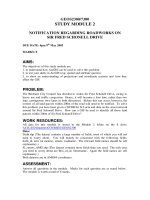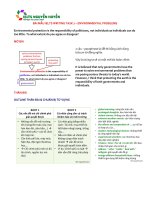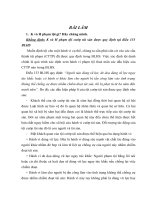Module 2 thermodynamics problems 2023 sent
Bạn đang xem bản rút gọn của tài liệu. Xem và tải ngay bản đầy đủ của tài liệu tại đây (99.52 KB, 2 trang )
Problems for Module 2, Physics 1: Thermodynamics
1) Give statements and corresponding formulae (if any) of four laws of thermodynamics.
2) Give the definition of an ideal gas.
3) Give the expression of the internal energy of a polyatomic ideal gas.
4) Give several applications of the first law of thermodynamics.
5) Describe briefly the operation of a heat engine.
6) Describe the Carnot’s cycle and establish the formula of efficiency of a Carnot engine.
7) What is the entropy of a system? Give one example of calculating entropy change in thermodynamic
processes.
8) Distinguish between reversible and irreversible processes.
9) What is the volume of a container holding 952.5 moles of an ideal gas at a temperature of 253.85 oC
and a pressure of 71790 Pa? Answer: 58.1 m3
10) A girl is running along a beach and she does 4.3×105 J of work and gives off 3.8×105 J of heat.
(a) What is the change in her internal energy?
(b) If she is not running but walking, she then gives off 1.2×105 J of heat and her internal energy
decreases by 2.6×10 5 J. How much work has she done while walking?
Answer: (a) –8.1x105 J; (b) 1.4x105 J
11) A cylinder contains 0.50 mol of an ideal gas at a temperature of 310 K. As the gas expands
isothermally from an initial volume of 0.31 m3 to a final volume of 0.45 m3, find the amount of heat that
must be added to the gas in order to maintain a constant temperature. Answer: 480 J
12) A heat engine with an efficiency of 24.0% performs 1250 J of work. Find
(a) the heat absorbed from the hot reservoir, and
(b) the heat given off to the cold reservoir by the engine.
Answer: (a) 5210 J; (b) 3960 J
13) Suppose you have a Carnot heat engine that can operate in two different modes. In mode 1, the
temperatures of the two reservoirs are T L = 200 K and TH = 400 K; in mode 2, the temperatures are TL =
400 K and TH = 600 K. Is the efficiency of mode 1 (i) greater than, (ii) less than, or (iii) equal to the
efficiency of mode 2? Answer: For mode 1, e1 = 1/2; for mode 2, e2 = 1/3; mode 1 is more efficient than
mode 2.
14) An ideal gas of volume 1 liter and pressure Pi undergoes a quasistatic adiabatic expansion until the
pressure drops to Pf = Pi/10. Assume γ to be 1.4.
(a) What is the final volume?
(b) The initial temperature is 300 K. Find the final temperature.
Answer: (a) 5.18 L; (b) 155.4 K
15) The value for the ∆U of a system is –120 J. If the system is known to have absorbed 420 J of heat,
how much work was done? Answer: 560 J
16) A gas is compressed isothermally from volume A.
The PV plot for this process is shown as curve (ii) in the
figure on the right. If the same gas is compressed
adiabatically, which curve would show the correct
curve? Curve (i) or curve (iii)?
17) One mole of neon gas is heated from 300 K to 420
K at constant pressure. Calculate (a) energy Q
transferred to the gas, (b) the change in the internal
energy of the gas, (c) the work done by the gas. Note
that neon has a molar specific heat of 20.79 J/mol.K for a constant – pressure process (Serway and
Faughn, prob. 55, page 386). Answer: (a) 2.49 kJ, (b) 1.50 kJ, (c) 0.99 kJ
1
18) A cylinder contains one mole of an ideal gas initially at a temperature of 0°C. The gas undergoes an
expansion at constant pressure of one atmosphere to four times its original volume.
1) Calculate the final temperature of the gas.
2) Calculate the work done during the expansion.
Answer: 1) 1.092 K 2) W = P∆V = 1.0 x 8.31(1092 – 273) = 6.81 kJ
19) Two moles of an ideal gas is compressed at a constant temperature of 600 K until its pressure triples.
How much work does the gas do?
Answer: W = nRTln(V2/V1) = nRTln(P1/P2) = 2x8.31x600ln(1/3) = –1.1x104 J
20) The energy absorbed by an engine is three times greater than the work it performs.
(a) What is its thermal efficiency?
(b) What fraction of the energy absorbed is expelled to the cold reservoir?
Answer: (a) e = 33%; (b) |Qc|/Qh = 2/3
21) A coal-fired power station is a huge heat engine. It uses heat transfer from burning coal to do work
to turn turbines, which are used to generate electricity. In a single day, a large coal power station has
2.50x1014 J of heat transfer from coal and 1.48x1014 J of heat transfer into the environment.
(1) What is the work done by the power station?
(2) What is the efficiency of the power station?
Answer: (1) W = 1.02x1014 J; (2) e = 0.408 = 40.8%
22) Calculate the work output of a Carnot engine operating between temperatures of 600 K and 100 K for
4000 J of heat transfer from the hot reservoir to the engine.
Answer: eC = 0.833 and W = 3333 J
23) A large electrical power station generates 1000 MW of electricity with an efficiency of 35.0%.
(a) Calculate the heat transfer to the power station, Qh, in one day. (b) How much heat transfer Qc occurs
to the environment in one day? Answer: (a) 2.47 × 1014 J; (b) 1.60 × 1014 J
24) The temperature, pressure, and volume of a gas-air mixture are initially 20°C, 1.00×10 5
N/m2, and 240 cm3, respectively. The mixture is compressed adiabatically to a volume of 40 cm3.
Assuming that γ = 1.4, find (a) the pressure and temperature of the mixture after the compression and (b)
the work done on the mixture during the compression.
Answer: (a) P2 = 1.23×10 6 N/m2 and T2 = 600 K; (b) W = –63 J, W < 0
the mixture receives
the work
25) 0.2 moles of a monatomic gas at 27 o C are in a closed container with unchanged volume. Heat is
added to the gas so that temperature of gas becomes 400 K. Given the universal gas constant R = 8.315
J/mol.K, find the quantity of heat added to the gas. Answer: Q = 249.45 J
2









